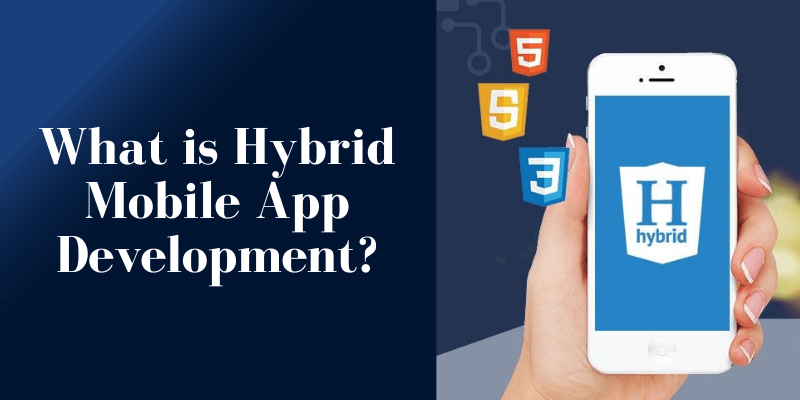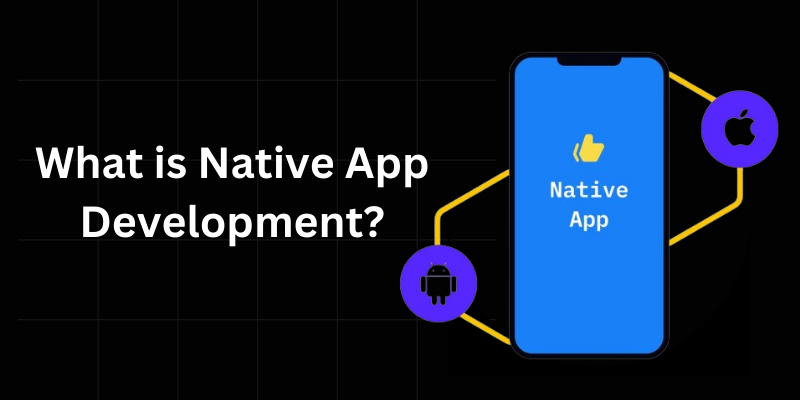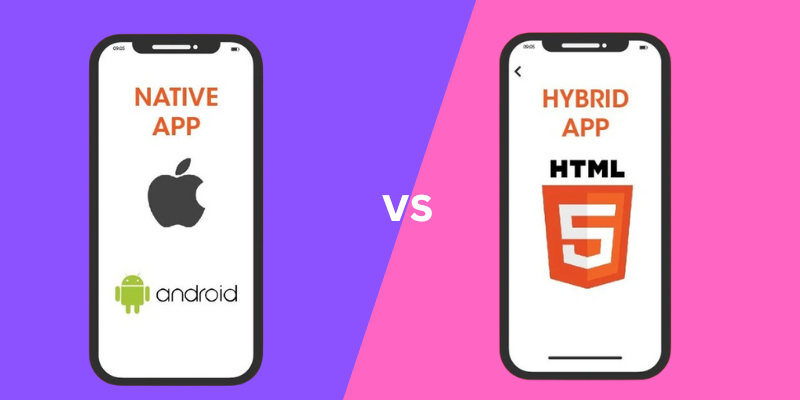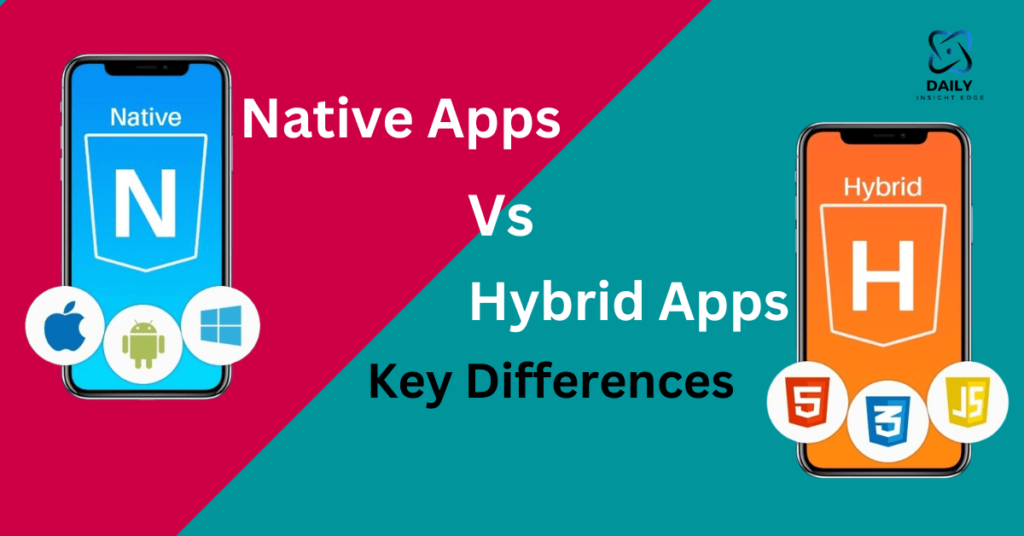The modern world exists in rectangular screens. The invention of smartphones marked the onset of this digital pool. The digital market has dominated every business. Everything is just a click away, from playing a game to ordering food online. All hail to this digital revolution! Every service is provided at our doorstep. In native vs hybrid mobile apps there’s an app for everything. Social media, online shopping, food, editing, entertainment, etc apps are available on every smartphone. Apps are popular due to their easy access. The audience is unknown to the backend processes. A well-defined UI is provided to users to access it. Almost everything that exists on your smartphone is an app.
App development is a large marketplace. Businesses have invested in app development and launched apps due to their popularity. The need to have a well-designed app for your business has become a necessity. Thus, to enhance the market reach. Your first decision should be to choose between in native app vs hybrid app.
What is Hybrid Mobile App Development?

A hybrid app uses HTML, CSS, Javascript, etc. They are installed on devices like other apps. It uses a native container. It displays web pages adapted from a desktop website. Hybrid mobile applications can leverage native plugins, enabling them to achieve functionalities akin to native apps without the need for extra coding efforts.
Popular frameworks used for hybrid app development are:
- React Native
- Xamarin
- Ionic
Advantages of Hybrid Apps
- When developing several versions of an app, hybrid apps offer a streamlined “one-size-fits-all” approach that can save cost and time
- Hybrid apps ensure consistent user experiences across various browsers, devices, and OS, any switches made by the user—this consistency, whether positive or negative, is an important advantage.
- With a single code base for all systems, hybrid app developers can write the code once and deploy it across different platforms as needed. In contrast, each platform requires separate development, updates, and programming for native apps.
Disadvantages of Hybrid Apps
- A hybrid mobile app’s user experience depends on factors such as its software, operating system, and version. This variety makes the necessary need to be more and more testing to reduce possible issues.
- Hybrid apps rely on native plugins for certain functionalities, but accessing entirely new device features through these plugins isn’t always straightforward. While skilled developers can create custom plugins, doing so adds complexity and challenges to the development process.
Examples of Hybrid Mobile Apps
- Baskin Robbins
- Pacifica
- X (Twitter)
- UBER
What is a Native App Development?

It is an app that is coded in a specified language. For example, Java is used for Android whereas for iOS, Swift, and Objective C is used. They are provided access to other apps on that smartphone. The native application is developed within a secured environment, following the technical standards and user experience guidelines specific to its target operating system.
Popular frameworks used for native app development are:
- Swift
- Objective C
- Java
- Kotlin
Advantages of Native Mobile Apps
- Native applications are designed for the platform, and they usually load faster. By maintaining the aspect ratio, they increase the app’s visuals and image quality.
- Their performance is good in offline environments, users can easily access core functionalities even without an Internet connection, even if they are stuck during flights or subway rides.
- Compared to JavaScript and HTML, native code is faster and ensures excellent performance for graphics-intensive applications, high-definition games, and applications with heavy animations.
Disadvantages of Native Apps
- Downloading native mobile apps often takes a lot of time. Users must go through the applications store, locate the app, agree to terms and conditions, and then proceed with the download. If this procedure is extremely time-consuming, prospective users might reach out before completing the download.
- The cost of developing native apps tends to be high due to the requirement for various skill sets among developers to create, sustain, and manage the same application across multiple platforms.
Examples of Native Mobile Apps
- Spotify
- Waze
- Tesla
- Pokemon Go
- SoundCloud
Read Also: Salesforce Integration With Third Party Applications
Native vs Hybrid Mobile Apps Differences

Let’s look at the differences between Native and hybrid mobile apps. It will help you make your choice!
1. Performance
Time is Money! A native app is faster. Native apps can be accessed directly by users through their phones. Thus, there is no need to download any data from the server. Everything is a tap away.
Whereas, in a hybrid app, only a wrapper is available to the user. All other data needs to be accessed from the server. This impacts the performance and speed of the app.
In hybrid vs native app, native app development wins this war!
2. App updates
A hybrid app downloads data from the server. Thus, the user does not have to take care of the updates. Updates are downloaded directly from the server. While scrolling, users will automatically see the update.
Whereas, a Native App user needs to update the app else changes will not be visible. Updation is manually required, or else an auto-update is also an option.
In hybrid apps vs native apps, Hybrid wins the war here!
3. Cost and Time
Hybrid Apps can be developed fast, in a short period. Developers can develop it within a few weeks. Thus, they are cheaper also. There is no need for an app developer for each platform, like in native apps. Thus, you don’t need different app development for iOS and Android platforms.
In native apps vs hybrid apps, Hybrid wins the race in cost and time terms.
4. User Experience
UX is a crucial aspect of mobile apps. Native apps are built for a single app store specifically thus, they provide the best UX experience. All the components are taken care of while developing for a certain platform. The size, resolution, etc.
Whereas, in a hybrid app. No Individual apps need to be developed for each platform. They are the same for each platform. This makes it a little clumsy.
Native apps provide a better UX experience.
5. Security
Hybrid apps have unique security vulnerabilities independent of the language used. They are susceptible to malware and hackers. It’s easy to get inside the app and affect it. Thus, Hybrid apps have a much higher security risk.
Whereas, it is not easy to access the code of the Native App. The exploitation technique is different and more difficult than a hybrid app.
Thus, native apps are more secure.
6. Testing
Native apps are individually created for each platform which makes them better. But it adds to the testing workload. Native apps can take advantage of the phone’s resources. Thus, testing is challenging.
Whereas, Hybrid apps are independent of the platform. As they are a combination of native and web pages. It is easy to code and test. Thus, the testing is faster indeed.
7. Free and Paid Apps
When planning for a native app, always go for Native apps. Since they have the best UI and performance. Many companies go for premium packages for apps. Thus, Native apps are best if you are providing a paid app.
Whereas, hybrid apps are best if going for a free app. Since they require less cost and time.
Native vs Hybrid Mobile App: Technology Stack
You can optimize your app’s performance and ensure hybrid mobile app development by choosing the right technology stack. This stack encloses various elements such as tools, programming languages, frameworks, and databases. In contrast, making wrong-advised choices in this regard can create significant challenges and increase development costs for the application.
For Native Mobile App
For Android app development, developers typically choose Java or Kotlin as their primary programming languages. When it comes to development tools, Android Studio and Android Development Tool stand out as the top choices, offering features such as code editing, automatic testing, debugging, and more.
In the realm of iOS app development, developers commonly choose Swift or Objective-C as their go-to programming languages. As for the tools for iOS native app development, Appcode and Xcode are the trusted solutions.
For Hybrid Mobile App
Hybrid apps are often crafted using standard web technologies such as CSS, HTML5, and JavaScript. These apps typically consist of backend and native shells. Among the frameworks commonly used by hybrid app developers for creating such apps are Cordova, Sencha Touch 2, and Ionic.
Conclusion
Each app development has its advantages and disadvantages in native vs hybrid mobile apps, whether native or hybrid. Choosing the right type depends on the needs of each company. For instance, if you have less time to develop an app, go for a hybrid. On the other hand, if you require excellent performance and user interface, go with native. It is dependent on the company’s requirements. The differences mentioned might help you in making your choice and hiring Android and iOS app developers. Choose wisely!
Frequently Asked Questions
1. Which is better native or hybrid mobile development?
70% of users prefer native app development over hybrid. App marketplaces like the App Store and Google Play, where native apps constitute approximately 90% of all downloads. Native mobile apps are faster and more responsive than hybrid apps and average. So going for the native app is a good choice.
2. Is WhatsApp a hybrid app?
Yes, WhatsApp is a hybrid app. It utilizes a web view, essentially a container for web-based content, integrated within a native app framework.
3. What is the difference between native and non-native apps?
Native mobile apps are developed for a particular operating system, delivering superior performance and a smoother user experience. Non-Native mobile applications can run across multiple operating systems, it is cost-effective and has time advantages during development but potentially be faced with performance restrictions.
4. How do I decide whether to develop a native vs hybrid mobile apps for my project?
The decision between native vs hybrid app development depends upon various factors such as your project requirements, budget, timeline, target audience, and desired app performance. You need to consult with experienced mobile app developers and evaluating the specific needs and goals of your project can help determine the most suitable approach.

Eliana Cooper is a highly analytical and results-oriented SEO Analyst and Digital Marketing Professional. She is an expert in blogging and content marketing, always sharing the newest trends and innovations at Daily Insight Edge.



Reading your articles is always a learning experience. This one was no exception. Great job!
You have a unique talent for writing. This article was informative, engaging, and beautifully written.